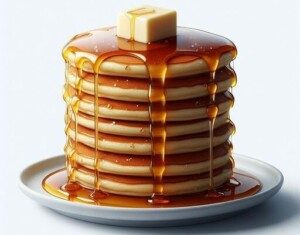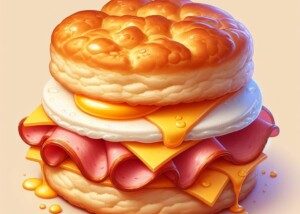Mmmm, a stack of steaming pancakes drenched in maple syrup and butter for breakfast: Is this healthier than SKIPPING breakfast?
Plenty of research shows that a nutritious morning meal is the most important meal of the day (or maybe the second-most important, if you rank the post-workout meal in the top spot for later-day workouts).
The Research on Breakfast for Kids
- Eating it is linked to lower risk of type 2 diabetes in children (Donin et al).
- Eating it is linked to higher IQ’s in kids (Liu et al).
- Skipping breakfast increases kids’ obesity and cardio-metabolic risk (Eloranta).
- Skipping is associated with reduced learning and reduced attention span in kids (Bennett et al).
And what about adults?
- Fuster et al found that skipping breakfast is associated with hardening of the arteries.
- It can lead to poor food choices for the rest of the day (Auestad et al).
- It may lead to high blood pressure and coronary artery disease (Cahill et al).
Note that some of these negative outcomes are associations rather than direct results.
We can venture to say that people who always pass on breakfast are less likely to be health conscious or put in grueling gym workouts.
Therefore, due to poor overall diet and lack of exercise, they’re more likely to develop type 2 diabetes or cardiovascular disease.
But the direct results, such as poor concentration, can’t be dismissed.
If the only breakfast available were pancakes, would it be better for your body to eat all this white flour, sugar and butter fat than to skip it?
“As a clinician, I am always one to promote eating something for breakfast,” says Amanda A. Kostro Miller, RD, LDN, whose specialties are nutrition counseling, weight loss and medical nutrition therapy.
“When we skip breakfast, we may get really hungry by lunch and overeat at lunch.
“While a pancake breakfast is not the best choice, there are small changes we can make to improve upon the nutritional profile of a pancake breakfast.
“Here are some ways to make a pancake breakfast better:
- Add fruit and/or nuts.
- Make your pancakes whole grain.
- Minimize the syrup.
- Control the amount of butter used.
- Instead of large pancakes, make yourself small/mini pancakes (control the number).
“Many people who don’t eat breakfast tend to have several obstacles that prevent them from actually eating breakfast (e.g., lack of time, don’t know what to make, want to sleep in, not hungry in the morning).
“However, if a client is already eating a breakfast (even pancakes), we can work on small changes to their breakfast to make it healthier.
“As a clinician, these small changes, rather than getting someone to prioritize their time to eat breakfast, can be easier.”
Certainly, a breakfast laden with white flour and sugar will satisfy hunger and prevent overeating at lunchtime.
Then again, if a pancake breakfast isn’t consumed with discrimination, it can have far more calories than overeating at lunch after a skipped breakfast.
A well-managed breakfast of pancakes should stave off poor concentration and reduced learning or impaired productivity in children at school and adults at work, respectively.
But remember, as much as the body wants and needs fuel shortly after it awakens from an overnight fast, if you put junk in your body, it will still be junk. Junk food is junk food.
Don’t give up pancakes if you love them. But make an effort to limit intake and make most of your breakfasts healthier options such as eggs with fruit and yogurt, or a fruit smoothie with a whole grain English muffin topped with a little butter.



























